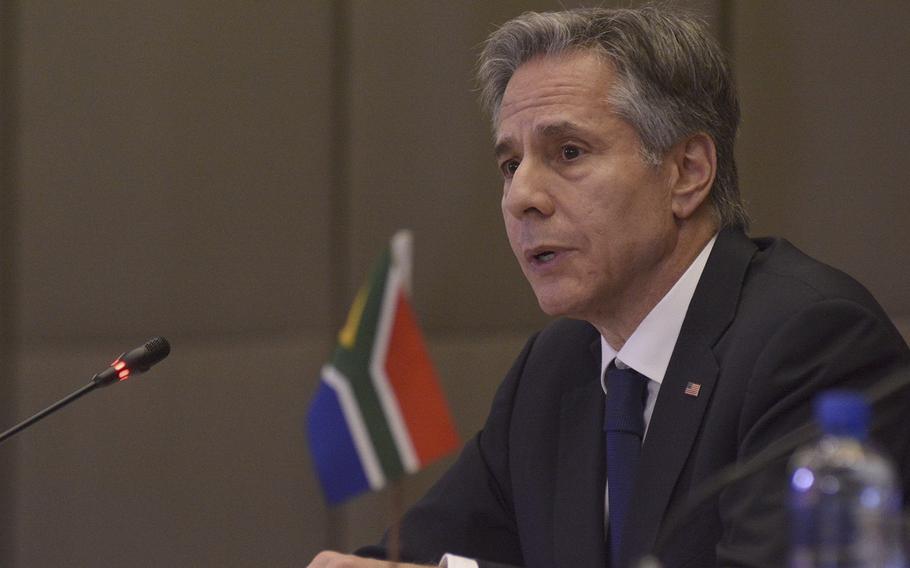
Antony Blinken, U.S. secretary of state, during a meeting with Naledi Pandor, South Africa’s foreign minister, in Pretoria, South Africa, on Aug. 8, 2022. (Waldo Swiegers/Bloomberg)
China has made a decision to seize Taiwan on a "much faster timeline" than previously thought, Secretary of State Antony Blinken said on Monday, shortly after China's leader reiterated his intent to take the island by force if necessary.
"There has been a change in the approach from Beijing toward Taiwan in recent years," Blinken said in an event at Stanford University in California.
The remarks from America's top diplomat on Monday come as China holds its twice-a-decade Communist party congress, and shortly after Chinese President Xi Jinping used a widely-watched speech on Sunday to say the "wheels of history are rolling on towards China's reunification" with Taiwan. While peaceful means were preferable, Xi added, "we reserve the option of taking all measures necessary."
Blinken said China had made a "fundamental decision that the status quo was no longer acceptable, and that Beijing was determined to pursue reunification on a much faster timeline." He didn't elaborate on the timing or provide other details.
Responding to Blinken's remarks on Tuesday, Chinese Foreign Ministry spokesman Wang Wenbin criticized the U.S. for selling billions in advanced weapons to Taiwan and accused the Biden administration of encouraging the island's move toward formal independence.
"Resolving the Taiwan question is a matter for the Chinese, a matter that must be resolved by the Chinese," Wang told reporters at a regular briefing. "We are ready to create vast space for peaceful reunification, but we will leave no room for separatist activities in any form."
Although Biden administration officials have regularly accused China of eroding the balance of power in the Taiwan Strait, comments about Beijing's intentions with regard to an invasion are less common.
Observers are highly sensitive to any remarks that might provide insights into how senior officials in Beijing or Washington view the potential for war over Taiwan — an event that would have enormous geopolitical and economic consequences, particularly given President Joe Biden's repeated pledges that the U.S. would help defend the island.
The State Department didn't immediately respond to a question on Monday about whether Blinken's comments reflected any formal assessment that China has moved up its agenda for taking Taiwan. In March of last year, Admiral Philip Davidson, then commander of the US Indo-Pacific Command, told the Senate Armed Services Committee that China wanted to take Taiwan "during this decade, in fact, in the next six years."
Taiwan is the main flash point between the U.S. and China. Tensions in the region have remained heightened since House Speaker Nancy Pelosi visited the island in August, prompting China to hold military exercises and fire missiles into the waters around Taiwan.
In his remarks on Monday, which came in a conversation with former Secretary of State Condoleezza Rice, Blinken reiterated critiques of China under Xi's leadership, saying the country was "more repressive at home" and "more aggressive abroad." In his comments on Taiwan, which were made in response to a question from the audience, Blinken said China was willing to do what it takes to win over Taiwan.
"If peaceful means didn't work, then it would employ coercive means," he said. "And possibly, if coercive means don't work, then maybe forceful means to achieve its objectives. And that is what is profoundly disrupting the status quo and creating tremendous tensions."